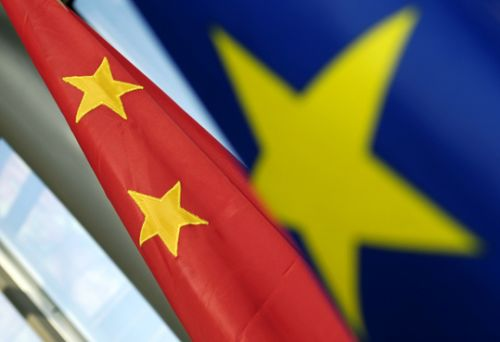 Ballerinas anywhere but onstage
Ballerinas anywhere but onstage
 Top 10 safest airlines in the world
Top 10 safest airlines in the world
 Top 10 most popular instant messaging apps in the world
Top 10 most popular instant messaging apps in the world
 Inspiring shadow images of Chinese army
Inspiring shadow images of Chinese army
 Models shine Xinjiang auto show
Models shine Xinjiang auto show
 From laid-off worker to int'l referee in bodybuilding
From laid-off worker to int'l referee in bodybuilding
 Selected photos of 'two sessions'
Selected photos of 'two sessions'
 Most unusual taxis around the world
Most unusual taxis around the world
 Bridge Worship Festival in Taijiang, SW China
Bridge Worship Festival in Taijiang, SW China
 |
| File Photo |
Chinese President Xi Jinping's current European trip marks a new departure for China-EU relations, and also presents three strategic opportunities for China and the EU; now is the perfect time for both China and Europe to achieve dreams, to develop together, and to act in mutual self-interest.
First is the reforming opportunity in China. Strengthening China's reform and continued EU integration provide great opportunities for bilateral cooperation. Both China and Europe have adopted a strategy for the years up to 2020, and both sides jointly adopted the "China-EU 2020 Strategic Agenda for Cooperation" during the 16th China-EU Summit in November of last year, setting out the shared aim of promoting cooperation in the four areas of peace and security, prosperity, sustainable development and people-to-people exchanges. China and the EU have become partners in reform.
China and the EU have long regarded each other as major economic and trade partners. In terms of internal divisions of responsibility, the Chinese premier is in charge of economic and trade matters, while the EU 'Cabinet' – the European Commission - is responsible for external trade affairs. Germany and other European countries also operate according to the cabinet system, so the structural process of China-EU relations is based on the role of Prime Minister.
The bilateral system is now improving. Xi Jining's trip to Europe marks the first visit of China's head of state to the Netherlands and to the EU headquarters in Brussels, and at the same time is the first such visit to Germany in 8 years. Xi's European trip injects new momentum into China-EU relations.
Second is the development opportunity for bilateral ties. Over the past 10 years China has become the second largest trading partner of the EU, and the EU has become China's largest trading partner. Sino-European economic relations are evolving from trade-led cooperation to a dual model driven by investment and trade. They are transforming from economic and trade dominant cooperation to include more contacts in economy, polity, and culture. These are indications that China and the EU have established a solid and high-level foundation in economic and trade dialogue, strategic dialogue, and cultural exchanges. After the Treaty of Lisbon came into force, China and the EU launched negotiations on a bilateral investment treaty - if both sides reach an agreement, it will offer more opportunities in terms of a Sino-European free trade zone negotiation.

 Female journalists at 'two sessions'
Female journalists at 'two sessions' Interpreters serving 'two sessions'
Interpreters serving 'two sessions' Female SWAT team in Chongqing
Female SWAT team in Chongqing Top 10 safest airlines in the world
Top 10 safest airlines in the world Old photos of Anti-Japanese War
Old photos of Anti-Japanese War Mysterious 'Dolan Tribe' in Xinjiang
Mysterious 'Dolan Tribe' in Xinjiang A bite of Luoping County
A bite of Luoping County This is Shanghai
This is Shanghai Chinese airborne troops complete parachute training in various training bases
Chinese airborne troops complete parachute training in various training bases Ballerinas anywhere but onstage
Ballerinas anywhere but onstage Most unusual taxis around the world
Most unusual taxis around the world Micro-expression at 'two sessions'
Micro-expression at 'two sessions' Bridge Worship Festival in Taijiang, SW China
Bridge Worship Festival in Taijiang, SW China Hollywood documentary brings Diaoyu Islands truth to new audience
Hollywood documentary brings Diaoyu Islands truth to new audience Miss HK and actresses shine at flower show
Miss HK and actresses shine at flower showDay|Week|Month